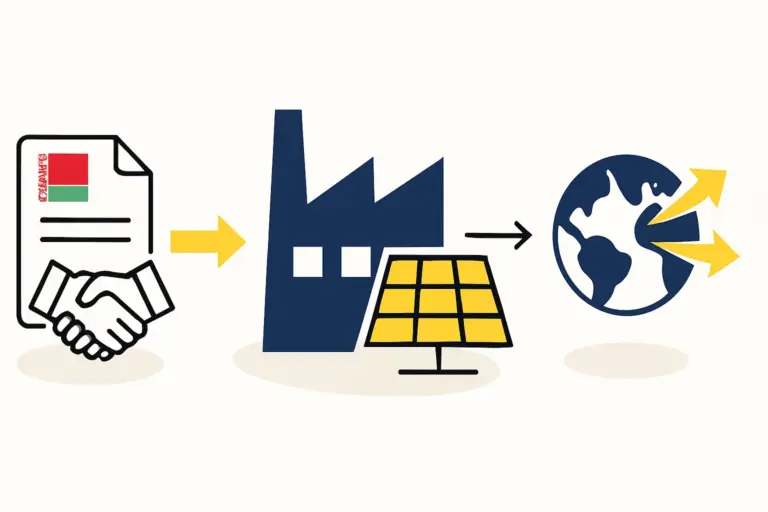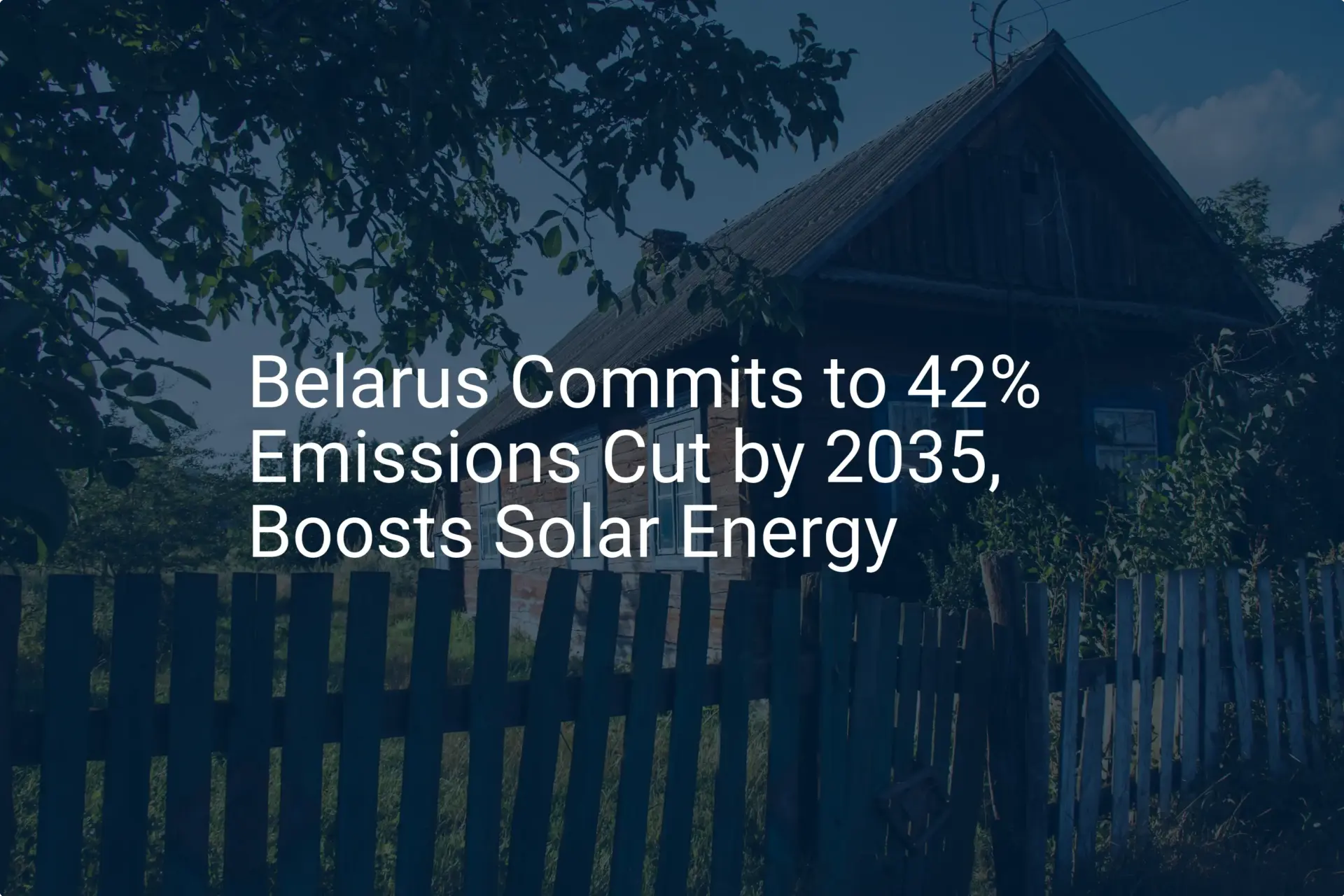Establishing a manufacturing facility in a new market presents a significant opportunity, but it’s one that involves navigating a complex administrative landscape.
For an entrepreneur setting up a solar module factory in Belarus, the journey from concept to operational plant is a sequence of specific legal and regulatory steps. While the country offers strategic advantages like access to Eurasian markets and supportive investment frameworks, success hinges on navigating its approval process with diligence and foresight.
This guide outlines the key permits, approvals, and certifications required, and is designed for business professionals familiar with investment but new to the specifics of Belarusian industrial regulations. Understanding this process is the first critical step toward transforming an ambitious project into a tangible asset.
Table of Contents
The Strategic Framework: Investment Agreements and Free Economic Zones
Before delving into specific permits, investors should understand the two primary pathways for a significant industrial project in Belarus. This choice influences both the administrative process and the incentives available.
- Investment Agreement with the Republic of Belarus: For large-scale projects, an investor can enter into a direct investment agreement. This route provides a bespoke set of guarantees, tax exemptions, and benefits negotiated directly with the government. Under the Law “On Investments,” this path is typically reserved for projects of strategic importance and requires a comprehensive business plan submitted to the Ministry of Economy.
- Residency in a Free Economic Zone (FEZ): Belarus has six Free Economic Zones (e.g., Minsk, Brest, Gomel-Raton) offering a standardized package of significant tax and customs incentives. Registering as a resident of an FEZ simplifies many procedures and provides a preferential tax regime, including exemptions from profit tax and real estate tax.
- Experience from numerous international projects shows the FEZ route is often the clearest and most streamlined process for a 20-100 MW solar factory.

A Step-by-Step Guide to the Permitting Process
Regardless of the chosen framework, the approval process follows a logical progression from corporate setup to operational launch.
Stage 1: Legal Entity Registration and Land Plot Selection
The foundational step is completing the company registration in Belarus. This typically involves registering a Limited Liability Company (OOO) or a Joint Stock Company (OAO/ZAO). The process, handled by regional executive committees, is generally straightforward and takes only a few business days with the correct documentation.
Simultaneously, selecting a land plot is critical. If operating within an FEZ, the zone administration will help allocate a suitable plot. For projects outside an FEZ, land is acquired through auctions or direct allocation by local authorities. The chosen land must be zoned for industrial use—a crucial detail to verify early in the planning process.
Stage 2: Design, Environmental, and Expertise Approvals
Once a legal entity and land plot are secured, the project’s technical and environmental planning can begin. This stage is meticulous and requires specialized documentation.
State Ecological Expertise: Before construction can be approved, the project must undergo an environmental impact assessment (OVOS). These findings are submitted to the Ministry of Natural Resources and Environmental Protection for a State Ecological Expertise. This review assesses potential environmental impacts and ensures the proposed factory complies with national ecological standards. The process can take one to three months and is a critical checkpoint for the project.
Architectural and Design Approval: A licensed Belarusian design organization must develop a detailed architectural and engineering plan for the factory. This plan covers building layouts, utility connections, fire safety measures, and labor protection protocols.
The design documentation is then submitted for a State Construction Expertise (Gosstroiexpertiza), which verifies its compliance with all technical codes and standards. A common challenge for international investors at this stage is adapting their intended factory layout to local construction norms. Working with an experienced local design partner is essential for avoiding costly revisions and delays.

Stage 3: Construction and Technical Permits
With approved design documents, the project moves into the construction phase.
Construction Permit: The main construction permit is issued by local architectural and construction authorities. This permit allows site preparation and building to begin. Throughout construction, the State Construction Supervision body will conduct inspections to ensure the work conforms to the approved plans.
Utility Connections: Securing connections for electricity, water, gas, and sewage is a parallel process. Applications are made to the relevant regional utility providers (e.g., Belenergo for electricity). The technical specifications for these connections are part of the approved design plan. In regions with developing infrastructure, this can be a lengthy process and should be initiated as early as possible.
Stage 4: Operational Licensing and Certification
After construction is complete, a final set of approvals is needed before manufacturing can begin.
Commissioning Acceptance: A state acceptance commission, including representatives from construction supervision, environmental, sanitary, and fire safety bodies, inspects the finished facility. They verify that the factory was built according to the project design and is safe for operation. A successful inspection results in an “Act of Acceptance,” which officially clears the building for use.
Product Certification: To be sold within the Eurasian Economic Union (EAEU – which includes Russia, Kazakhstan, etc.), solar modules manufactured in Belarus must comply with the EAEU’s technical regulations. This requires obtaining the Eurasian Conformity (EAC) mark. The process involves submitting technical files, sending samples for testing to an accredited laboratory, and potentially a factory audit. Understanding the requirements for solar panel certification is crucial for market access.

Key Belarusian Authorities and Their Roles
Navigating the process successfully requires effective interaction with several key state bodies. A clear understanding of their functions helps streamline communication:
- Ministry of Economy: Oversees national investment policy and manages large-scale investment agreements.
- Free Economic Zone (FEZ) Administration: The primary point of contact for investors operating within an FEZ, providing administrative support and guidance.
- Ministry of Natural Resources and Environmental Protection: Conducts the State Ecological Expertise.
- State Committee for Standardization (Gosstandart): Oversees technical regulations, metrology, and the accreditation of certification and testing bodies for the EAC mark.
- Local Executive Committees (Oblispolkom/Gorispolkom): Responsible for company registration, land allocation, and issuing construction permits.
Frequently Asked Questions (FAQ)
Q: How long does the entire approval process typically take?
A: From legal entity registration to obtaining the final Act of Acceptance, a timeline of 9 to 18 months is realistic. This can be influenced by the project’s complexity, the efficiency of local partners, and whether the project is in an FEZ, which can expedite certain steps.
Q: What are the main benefits of operating in a Free Economic Zone (FEZ)?
A: Key benefits include a five-year exemption from profit tax (followed by a 50% reduction), an exemption from real estate and land taxes, and customs-duty-free import of raw materials and equipment. This significantly improves the financial model for a new factory.
Q: Is knowledge of Russian or Belarusian necessary to navigate this process?
A: While official proceedings and documentation are in Russian or Belarusian, investors do not need to be fluent. However, engaging reliable local legal counsel, a design firm, and a project manager who are fluent and experienced with industrial projects is critical for success.
Q: What is the role of the State Committee for Standardization (Gosstandart)?
A: Gosstandart is the central body for technical regulation. For a solar module manufacturer, its most important function is overseeing the conformity assessment procedures required to obtain the EAC mark, which is the passport for selling products across the EAEU.
Conclusion: The Path Forward
Establishing a solar module factory in Belarus is a structured, multi-stage journey through its regulatory landscape. While the process is detailed, it is also transparent and navigable with careful management. The key to success lies not in becoming an expert on every regulation, but in methodical planning, engaging qualified local partners, and understanding the critical path from one approval to the next.
For any entrepreneur looking to enter this market, the first step is to create a detailed project plan that maps out these regulatory milestones. A well-prepared business plan and a clear understanding of the permitting timeline form the bedrock of a successful investment. Having a structured approach, often supported by educational resources like the e-courses at pvknowhow.com, can provide the clarity needed to proceed with confidence.






